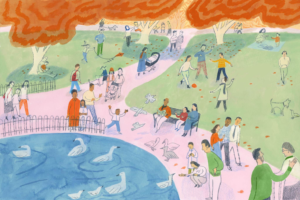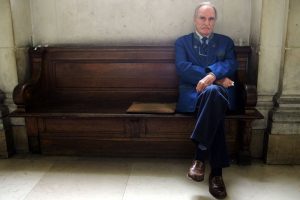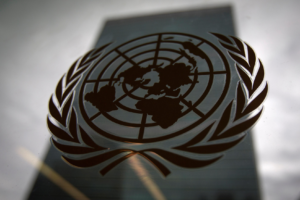Survivor and activist Setsuko Thurlow discusses today’s nuclear weapons threat with Husna Ara.
In the wake of this year’s fascination with Oppenheimer – a blockbuster film about the man who built, and subsequently regretted building, the first nuclear bomb – came renewed concern for the current state of the nuclear arms race.
Some weeks after the film’s release, the Bulletin of Atomic Scientists – an organization of which J. R. Oppenheimer himself was a board member – called an online meeting to discuss today’s complacency toward the proliferation of nuclear weapons.
Setsuko Thurlow was one of the speakers at the meeting. A Japanese woman from Hiroshima, she survived the ‘Little Boy’ bomb the United States dropped on the city on 6 August 1945, killing more than 100,000 people.
Setsuko was 13 at the time. As well as losing the majority of her family members to the blast, she recalls how her fellow students and her teacher suffered catastrophic injuries, including the melting of skin and flesh due to heat from the explosion. Many of those outside the blast radius who were not instantly vaporized were rendered unrecognizable from their burns, including Setsuko’s beloved elder sister and her four-year-old son – both of whom died.
Descendants of nuclear bomb survivors (known in Japan as hibakusha) report developing radiation-related disabilities and facing social stigma when looking for a partner. Beyond Japan, campaigns have cropped up in the UK and the Marshall Islands on behalf of those who developed cancer and other illnesses as a result of living near atmospheric test sites.
Now aged 91, Setsuko uses her experience to guide the International Campaign to Abolish Nuclear Weapons (ICAN) in its efforts. ICAN was awarded the Nobel Peace Prize in 2017.
On a Zoom call from her home in Toronto, she spoke to New Internationalist about the meaning of survivor testimony and the disinformation on which nuclear proliferation depends.
In The Vow from Hiroshima, the 2020 documentary film about your life, you spoke about how the church was a foundation for your activism. Could you say more about this?
Well, I was a 13-year-old teenager [when the bomb was dropped], and that’s a very important part of our life when we start questioning our relationship to the world and the meaning of life and death.
After the kind of experience we had in Hiroshima, every day I had questions. ‘Why was I rescued by a total stranger in total darkness?’ I didn’t even see that person’s face. But somehow that happened. I live. I survived it. What is the meaning of this?
I happened to be at a Christian school and I spent 10 years there. During that time, I met a lot of very thoughtful and wonderful educators and friends. Though of course, there are many teachings I couldn’t fully accept.
In those days, in the totally devastated city of Hiroshima, people were starving, there was no place to sleep. They slept on the debris. They felt ill from the radiation and they started dying. So, death and hunger and homelessness, all the social ills existed. My church minister was so dedicated in supporting the weak, suffering people. He used to teach us that Christian faith without action is not Christian faith.
When did you first begin your formal campaigning activism?
It was 1954, when I graduated from university in Japan and accepted a scholarship to study in the United States. That was a very significant year because the US was testing the hydrogen bomb, the biggest hydrogen bomb.
This was a really eye-opening experience for the Japanese. They said: ‘Not only Hiroshima and Nagasaki? That’s not enough?’ Japan stood up and decided to work against nuclear weapons. Thirty million petition signatures were collected.
The newspaper people asked my opinion about it and I started receiving unsigned hate letters at the university. That was the beginning. That made me realize my special responsibility. I can’t just remain silent.
Do you feel hibakusha testimony has been taken seriously in global politics?
Hibakusha felt strongly that what we experienced is not something anybody else in the world should experience. It’s totally inhumane, particularly the indiscriminate attacks on civilians.
Friends in the US listened to us. But politicians were not interested; they ‘listen’ to you, but they’re not really listening. I can see huge change in the North American atmosphere; I have enormous respect for their dedication and a lot of empathy for them. It’s not easy to be an anti-nuclear activist, especially in the United States, the nation where the whole thing started.
What we have been saying is: ‘As long as nuclear weapons exist, there is no safety, no security. Total abolition is the only way.’
Of course, some people want to treat it as a very naive emotional response, to say we are ‘not being realistic’. But, imagine: At the United Nations in 2017, two-thirds of member states voted for the new Treaty on the Prohibition of Nuclear Weapons. That’s the majority of the world.
What do you say to people who argue that we don’t need a total abolition of nuclear weapons, who argue that this technology is useful? How do you persuade those people?
Useful? Yeah. Useful to protect us from the ‘bad guys’? People just have to learn what nuclear weapons are. It’s not just killing the enemies, but killing yourselves. That’s what our world has been doing repeatedly.
There is no end to the arms race if they keep piling up [weapons] on both sides. For total elimination, reduction would be the immediate first step. Gradually we can reduce and come to the point where the whole world is without nuclear weapons. That’s the kind of process I would like to see.
This newest treaty, the Treaty on the Prohibition of nuclear weapon adopted at the United Nations by 122 nations is saying in 10 years’ time this is possible.
We have wasted so many years. No more excuses.
Coming to the 2017 treaty, how has the mood changed in diplomacy circles and activist circles? Is it making your job easier?
This new treaty is a tool for us to promote the idea of disarmament, abolition, elimination. It’s an all-inclusive prohibition treaty that makes it illegal under international law to have or threaten enemies with nuclear weapons.
This is something the survivors have been waiting a long time for, and certainly with this treaty we feel better equipped to deal with the issue; people are paying more serious attention. It especially helped to get the honour of a Nobel Peace Prize.
Nuclear-weapon states find it embarrassing that such a treaty came into force. But we are delighted. We don’t want to be manipulated by a minority of just nine nuclear states. They made the commitment they would fulfil their legal responsibility under Article 6 of the Non-Proliferation Treaty. For almost half a century they have ignored it. You can imagine why the rest of the world is saying enough is enough.
We feel the NPT and this new treaty together, these two treaties should be able to take the world to the final goal of eliminating all nuclear weapons.
What do you wish journalists asked you more about?
Usually, journalists are interested in hearing the gory details of what we saw that day, in terms of the medical and physical destruction. Yes, that’s an important part of reporting to the world. But to me, people experienced that moment in hours, days, weeks and years afterwards, in the struggles they had, and how they finally figured out the meaning of their experiences.
It took a long time because we were under the occupation of the United States and we were not free to do or know things. We were forbidden to share our experiences with the world. There was censorship of newspapers, survivors’ diaries and pictures; 32,000 items were confiscated. They were shipped to the United States. So, there were a lot of efforts to keep secrets about what we experienced.
It was a struggle to find out the meaning of our survival and the meaning of that experience. We had to wait till the end of the occupation to start learning about that.
What keeps you going in your activism?
I feel like giving up this work, but I can’t. I have the images and memories of hundreds, thousands of school friends, my own sister, my four-year-old nephew, and hundreds of thousands of people who vanished. They disappeared from the face of the planet in one stroke. People just have to use their imaginations to understand what it means to lose your loved ones; for your beloved city to disappear in one stroke.
I realize it’s difficult for people to understand what it really means to live in a nuclear age. We just can’t use the old notion of war. It’s indiscriminate and instantaneous death.
We have 13,000 nuclear weapons in the world today, not the ‘baby’, primitive ones they used on Hiroshima and Nagasaki, more advanced ones. So, it would be the end of the world. Our life is too precious, our world too beautiful.




